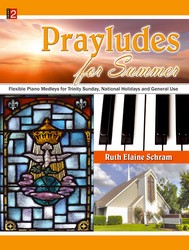- |
User Links
330
Savior, Like a Shepherd Lead Us
Hymn Information
- First Line
- Savior, like a shepherd lead us
- Author (attributed to)
- Dorothy A. Thrupp (1836)
- Text Source
- <i>Hymns for the Young,</i> 1836
- Tune Name
- BRADBURY
- Composer
- William B. Bradbury
- Topic
- Jesus Christ: Savior · Jesus Christ: Shepherd/Good Shepherd · Walk with God
Copyright Information
- Text Copyright
- Public Domain
- Tune Copyright
- Public Domain
- Reprint/Projection Information
- Words and Music: The Words and Music are in the Public Domain; you do not need permission to project or reprint the Words and Music.
Full Text
Scripture References
Further Reflections on Scripture References
The text is a prayer for divine guidance and obedience to God's will. Psalm 23 and the parable of the good shepherd (John 10:18) were the inspiration for stanzas 1 and 2; the remaining stanzas contain other biblical phrases.
Psalter Hymnal Handbook
Confessions and Statements of Faith References
Further Reflections on Confessions and Statements of Faith References
This song includes a plea and a prayer seeking God’s leading and care. Those who seek this leading can know that the Holy Spirit always aims to provide just such care for the believer. He not only renews our hearts, but also “leads us into truth, and helps us to pray, stands by us in our need, and makes our obedience fresh and vibrant” (Our World Belongs to God, paragraph 29).
330
Savior, Like a Shepherd Lead Us
Tune Information
- Name
- BRADBURY
- Key
- D Major
- Meter
- 8.7.8.7 D
Recordings
330
Savior, Like a Shepherd Lead Us
Hymn Story/Background
Although sometimes ascribed to Dorothy A. Thrupp, in whose Hymns for the Young (fourth ed., 1836) it appeared, this text is the work of an unknown author. The original four stanzas appear in the Lift Up Your Hearts, like they did in the Psalter Hymnal 1987, with the modern pronouns ("you" rather than "thou").
The text is a prayer for divine guidance and obedience to God's will. Psalm 23 and the parable of the good shepherd (John 10:18) were the inspiration for stanzas 1 and 2; the remaining stanzas contain other biblical phrases.
Inspired by Psalm 23 and Jesus’ parable of the good shepherd, this anonymous text was set to music by William B. Bradbury and published in one of his many Sunday school hymnals. The hymn gained popularity when Moody and Sankey used it in their crusades.
Author Information
Dorothy Ann Thrupp (b. London, England, June 10, 1770; d. London, England, December 15, 1847) contributed some hymns, under the pseudonym of "Iota," to W. Carus Wilson's Friendly Visitor and his Children's Friend. Other hymns by her, signed "D.A.T.," appeared in Mrs. Herbert Mayo's Selection of Hymns and Poetry for the Use of Infant Schools and Nurseries, 1838. She was also the editor of Hymns for the Young, c. 1830, in which all the hymns were given anonymously.
—
The Hymnal 1940 Companion
Composer Information
William B. Bradbury (b. York, ME, 1816; d. Montclair, NJ, 1868) came from a musical family who encouraged him from an early age to learn to play various musical instruments. In 1830 his family moved to Boston. There he studied singing with Lowell Mason and sang in Mason's Bowdoin Street Church choir. In 1841 Bradbury moved to Brooklyn, New York, and became the organist at the Baptist Tabernacle in New York City. He organized children's singing classes, which developed into annual singing festivals and stimulated the teaching of music in the New York public schools. In 1854 William joined his brother Edward and a German piano maker to begin a piano firm, which became the Bradbury Piano Company. Bradbury wrote or edited sixty collections of popular music and edited and published numerous song books, including The Psalmodist (1844) and Golden Shower of Sunday School Melodies (1862). He is sometimes known as "the father of Sunday school hymnody."
—
Bert Polman
Song Notes
Many versifications of Psalm 23 act as hymns of assurance and confessions of trust. We know the text well – “The Lord is my shepherd, I shall not want.” This text, attributed to Dorothy Thrupp, differs from those texts. Rather than an assertion of our faith, it is a prayer that stems from our faith. It goes, if you will, a step further than the psalm’s declaration. We know that God is our Shepherd. We know why we trust. And because we have that trust, we ask that God be faithful. We acknowledge our dependency and our emptiness, and ask that God would provide. We ask not in doubt, but in faith. Every verse of this hymn contains a promise we have from God, and a prayer we make because of that promise. This is how we are called to live our lives as followers of Christ – in prayer, because of faith. Thrupp’s text is a beautiful example of how we might live out that calling.
—
Laura de Jong
Suggestions or corrections? Contact us


 My Starred Hymns
My Starred Hymns






